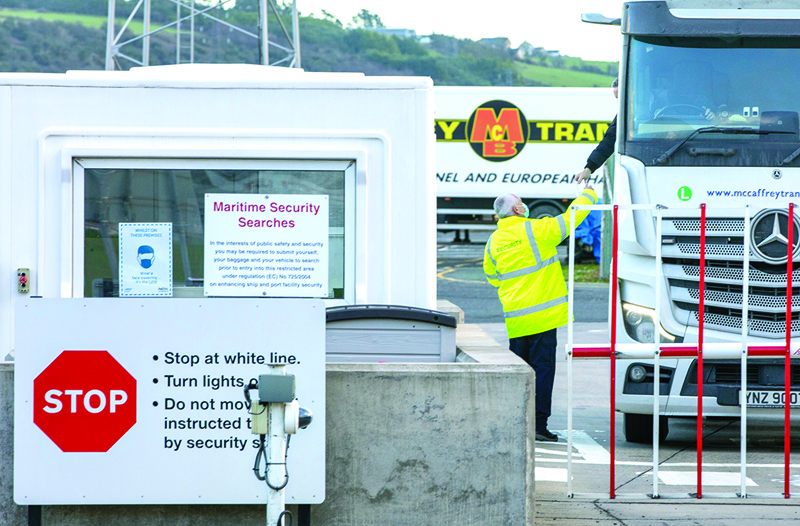 In this file photo taken on January 01, 2021 an official checks freight from Scotland as truckers disembark a ferry at the Port of Larne in County Antrim, Northern Ireland. - AFP
In this file photo taken on January 01, 2021 an official checks freight from Scotland as truckers disembark a ferry at the Port of Larne in County Antrim, Northern Ireland. - AFPDUBLIN: Border inspections at two Northern Irish ports were suspended yesterday, after staff were threatened over contentious new Brexit controls in the long-divided British province. The development comes just over a month into new trading arrangements after Britain's departure from the European single market, and warnings they could stoke lingering sectarian sentiment in Northern Ireland. The European Commission said staff working at the two border posts in Northern Ireland were also told "not to attend to their duties" yesterday after the "threat of violence" prompted regional authorities to pull staff from ports.
Northern Ireland's Department of Agriculture, Environment and Rural Affairs, said late Monday that regulatory animal-based food checks were dropped at Belfast and Larne ports "in the interests of the wellbeing of staff". At Larne Port, the local Mid and East Antrim Borough Council withdrew 12 staff after "an upsurge in sinister and menacing behavior in recent weeks", with hardcore unionists blamed.
The council cited "the appearance of graffiti within the local area referencing increasing tensions around the Northern Ireland Protocol and describing Port staff as 'targets'". Regional media reported that attempts seemed to have been made to collect information on staff, including vehicle registration plates, in acts of intimidation recalling the darkest days of "The Troubles" in Northern Ireland. The Northern Ireland Executive-formed under a power-sharing agreement between pro-British unionist and republican parties who want a united Ireland-jointly condemned the situation. Police patrols have since been stepped up, while Northern Ireland's leaders are due to talk to UK and EU ministers today.
The protocol
The Northern Ireland Protocol came into effect on January 1, when the Brexit transition period ended and the full effects of the UK's 2016 decision to split from the EU were finally felt. The protocol is designed to prevent a hard border emerging between Northern Ireland and EU member the Republic of Ireland-a frequent flashpoint in three decades of violence over British rule.
Up to 1998, some 3,500 people were killed as unionists who favored ties to Britain engaged in a deadly tug-of-war with republicans seeking to merge the province with Ireland. Security checkpoints and patrols along the 500-kilometre (310-mile) border were targeted by republican paramilitaries in some of the bloodiest chapters of the sectarian violence. Post-Brexit, London and Brussels feared splinter republican groups still active after the 1998 Good Friday Agreement peace deal could target checks and use them as a recruiting tool to grow their base.
'Sea border'
The protocol avoids the need for a hard border by transplanting EU single market and customs union checks to Northern Irish ports and airports. However, some unionists believe they create a de facto "sea border" between Northern Ireland and mainland Great Britain-England, Scotland and Wales. They feel the border disrupts the key principle of free movement between the united territories and binds the province in an economic union with Ireland. Unionists-and more hardcore loyalists sometimes linked to paramilitaries-branded 2019 legislation to enact the Northern Ireland protocol "The Betrayal Act".
Last week, PSNI Assistant Chief Constable Mark McEwan told UK lawmakers that officers were noticing "growing discontent" among the unionist community-chiefly graffiti and on social media. Northern Ireland's first minister Arlene Foster-head of the Democratic Unionist Party (DUP) -- called threats against port staff "utterly reprehensible". She told broadcaster UTV that "there is community tension in Northern Ireland".
The protocol became the renewed focus of unionist ire last weekend after a coronavirus vaccine row pushed the European Commission to warn it would invoke "Article 16" of the treaty to restrict jab exports to the province. The fallback provision allows London or Brussels to unilaterally suspend aspects of the deal in special circumstances. Brussels quickly backtracked on the threat-now widely considered a diplomatic bungle-after criticism from the UK, Ireland and all of Northern Ireland's mainstream political parties. - AFP









